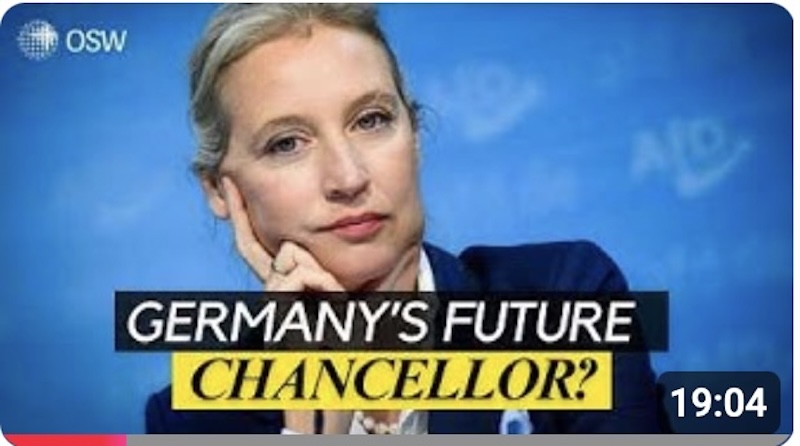#ChatGPT gives the following YouTube summary:
The video provides an in-depth analysis of Alice Weidel, the Alternative for Germany (AfD) candidate for Chancellor in the 2025 German federal elections. It explores her background, political evolution, and role in the party.
Background & Career
- Early Life & Education: Weidel was born in western Germany into a bourgeois family and studied economics and management at the University of Bayreuth, supported by a scholarship from the Konrad Adenauer Foundation. She conducted research in Southeast Asia and China, learning Mandarin and writing a doctoral thesis on China’s pension system.
- Professional Career: Before entering politics, she worked in the financial sector.
- Entry into Politics (2013): Initially, Weidel joined the AfD when it was primarily focused on economic policy, particularly opposition to the Euro. Over time, the party shifted towards a more radical right-wing stance, especially on migration and nationalism.
- Rise in the AfD: By 2015, she was elected to the party executive, and in 2017, she became a Bundestag candidate. She later assumed leadership alongside Tino Chrupalla in 2022, representing different wings of the party—Weidel from western Germany and Chrupalla from the more radical eastern faction.
Contradictions in Public Image
- Personal Life: Weidel lives in Switzerland with her partner, Sarah Bossard, and their two adopted children. While the AfD strongly opposes same-sex marriage and promotes traditional family values, Weidel presents her household as fitting within these principles by emphasizing that she plays a traditional wife role.
- Nazi Family History: Her grandfather, Hans Weidel, was a Nazi SS officer during World War II. However, Weidel has distanced herself from this, stating she had no contact with him.
- Shifting Political Alignments: Initially seen as a moderate in the AfD, she opposed the party’s most radical leader, Björn Höcke. However, recognizing his influence, she later aligned with him, cementing her leadership.
AfD’s Strategy & Future Prospects
- Growing Popularity: The AfD is currently polling as the second-largest party in Germany, its best result in years. Weidel’s composed, analytical rhetoric appeals to many, particularly young supporters.
- Key Campaign Issues: The party focuses on strong border controls, mass deportations, and opposition to progressive educational programs. Weidel’s main appeal is her ability to discuss controversial topics in a seemingly rational and composed manner.
- Election Outlook: While an outright victory is unlikely in 2025, the AfD is expected to become the strongest opposition force in parliament. However, internal conflicts may resurface if election results are disappointing.
Conclusion
Alice Weidel has successfully positioned herself as a dominant force within the AfD, balancing its radical and moderate elements. While her leadership has stabilized the party, its future depends on electoral success and external factors, particularly migration issues, which historically boost AfD’s support.

